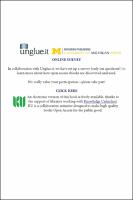Partisan Gerrymandering and the Construction of American Democracy
External Review of Whole Manuscript
Author(s)
Engstrom, Erik J.
Collection
Knowledge Unlatched (KU)Number
103432Language
EnglishAbstract
Engstrom evaluates redistricting plans and their electoral results from all states from 1789 through the 1960s, revealing that districting practices systematically affected the competitiveness of congressional elections; shaped the partisan composition of congressional delegations; and, on occasion, determined control of the House of Representatives.Erik J. Engstrom offers a historical perspective on the effects of gerrymandering on elections and party control of the U.S. national legislature. Aside from the requirements that districts be continuous and, after 1842, that each select only one representative, there were few restrictions on congressional districting. Unrestrained, state legislators drew and redrew districts to suit their own partisan agendas. With the rise of the "one-person, one-vote" doctrine and the implementation of the Voting Rights Act of 1965, however, redistricting became subject to court oversight.Engstrom evaluates the abundant cross-sectional and temporal variation in redistricting plans and their electoral results from all the states, from 1789 through the 1960s, to identify the causes and consequences of partisan redistricting. His analysis reveals that districting practices across states and over time systematically affected the competitiveness of congressional elections; shaped the partisan composition of congressional delegations; and, on occasion, determined party control of the House of Representatives. Partisan Gerrymandering and the Construction of American Democracy provides a rich look at the practice of gerrymandering. It is a nice mix of history and quantitative analysis.
Keywords
Political ScienceISBN
9780472119011Publisher
University of Michigan PressPublisher website
https://www.press.umich.edu/Publication date and place
2013Grantor
Imprint
University of Michigan PressClassification
Politics and government


 Download
Download